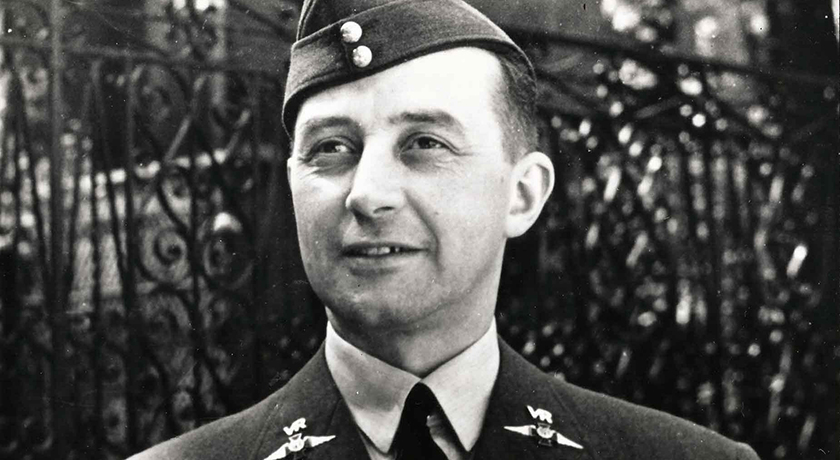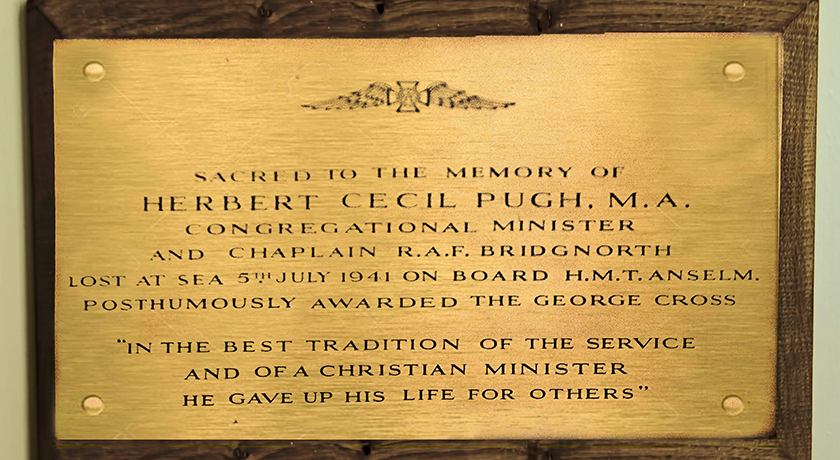 This week marks the 77th anniversary of an act of faith that led the Revd Herbert Cecil Pugh to become the only church minister awarded the George Cross.
This week marks the 77th anniversary of an act of faith that led the Revd Herbert Cecil Pugh to become the only church minister awarded the George Cross.
RAF Chaplain, Squadron Leader Cecil Pugh, was aboard a troopship, the SS Anselm, sailing for West Africa when it was torpedoed by the Germans on 5 July 1941. Mr Pugh did his best to help the injured but, hearing that many men were trapped in the hold, insisted on being lowered into it, despite it already being below the water line. Mr Pugh insisted that he needed to be with his men and that his love of God was greater than his fear of death. According to the citation made in 1947, Mr Pugh knelt with the men in prayer as the ship went down. He was never seen again.
Mr Pugh’s family only discovered the exact circumstances of his death six years after the event, and in 1947 he was posthumously awarded the George Cross.
‘When the story broke, a journalist asked my mother if he was brave,’ says his daughter Fiona Daukes. ‘My mother replied that my father wasn’t brave, but that he had learned to be obedient to that voice within. For him it was just the next step.’
Mr Pugh was a Congregational clergyman and part of the Oxford Group which inspired Alcoholics Anonymous. The Oxford Group was a Christian movement based on the premise that moral compromise limited human potential and harmed relationships. The group was convinced that change in individuals was the best way of ‘remaking’ the world. The group advocated the principles of absolute honesty, absolute purity, absolute unselfishness, and absolute love. Alcoholics Anonymous was founded when two addicts met an Oxford Group member and had a liberating experience from their alcoholism.
‘My grand-mother had told my father to find out about the Oxford Group because an acquaintance had changed dramatically,’ says Mrs Daukes. ‘My parents were invited to one of the group’s house parties (where members met to relate their experiences) and afterwards a friend said she had never seen someone’s face become so different between Friday and Monday. People from all over the world came to our home in north London and many found a new way of life.’
In 1938, the Oxford Group launched a campaign for ‘moral and spiritual rearmament’, based on the four absolute standards. The Oxford Group then became known as Moral Re-armament (MRA) which focused its efforts on building a ‘hate-free, fear-free, greed-free world’ as the Second World War advanced. Today, MRA is known as Initiatives of Change (IoC), which has recently released a new documentary, ‘The Man Who Built Peace’, about the life of Frank Buchman, the founder of The Oxford Group, who was recognised by several nations for his efforts at rebuilding peace between enemy countries of the Second World War.
 It is clear that Mr Pugh’s faith in God and work with MRA influenced his decision that fateful day in 1941.
It is clear that Mr Pugh’s faith in God and work with MRA influenced his decision that fateful day in 1941.
Mrs Daukes recalls the 50th anniversary of Mr Pugh’s sacrifice, celebrated at Runnymede Memorial in 1991.
‘People came in and I didn’t know who they were,’ says Mrs Daukes. ‘Afterwards I found out that they were survivors from the ship who saw him go down.
‘One of the survivors told us he would have remembered my father regardless of the circumstances of his death. The day before he died, the man saw my father pick his way through the troops on the ship to speak to the men. The care he was giving to the soldiers must have struck this man. It’s wonderful and very touching. Who knows how we would react in a situation like that. We can only hope we would have the strength to do what’s right.’
Picture 1: The Revd Herbert Cecil Pugh: Fiona Daukes
Picture 2: A plaque dedicated to Mr Pugh at the Armed Forces Chaplaincy Centre, Amport House, Andover: David Blake




